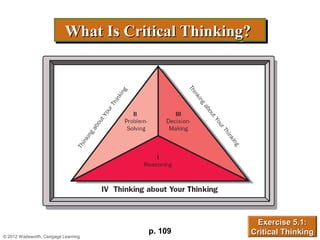
P art one reasoning
- 1. What Is Critical Thinking? What Is Critical Thinking? Exercise 5.1: p. 109 Critical Thinking © 2012 Wadsworth, Cengage Learning
- 2. I. Reasoning: Induction vs. Deduction I. Reasoning: Induction vs. Deduction Inductive arguments go from Deductive arguments go from specific observations to general broad generalizations to specific conclusions conclusions © 2012 Wadsworth, Cengage Learning
- 3. I. Reasoning : Relevance and Adequacy I. Reasoning : Relevance and Adequacy Two things are required to judge the soundness of an argument: Relevance Adequacy Look at an example: Now look at this example: “I don’t see why all students have “Everyone taking Math 100 failed the to take an introductory writing test last Friday. I took the test last course. It’s a free country. Students Friday. Therefore, I will probably get shouldn’t have to take courses they an F in the course.” don’t want to take.” How many tests are left in the Is the statement “It’s a free country course? What other assignments relevant? What does living in a free figure into students’ grades? The country have to do with courses that information present may not be community college students are adequate to predict an F in the required to take? Nothing. course. © 2012 Wadsworth, Cengage Learning
- 4. I. Reasoning: Analyzing Arguments I. Reasoning: Analyzing Arguments Sound or Unsound? Is it Relevant? Is it Adequate? Is it Logical? The aim of argument, or of discussion, should not be victory, but progress. Joseph Joubert, French moralist © 2012 Wadsworth, Cengage Learning
- 5. I. Reasoning: Assessing Assumptions I. Reasoning: Assessing Assumptions Assumptions are things you take for granted, and they can limit your thinking. Understand your own assumptions and see an argument in new ways. “One day Kerry celebrated her birthday. Two days later her older twin brother, Harry, celebrated his birthday. How could that be?” Think! What assumptions are you making about this What we need is not the will to believe, but puzzle? the will to find out. Bertrand Russell, British © 2012 Wadsworth, Cengage Learning philosopher, logician, and mathematician
- 6. I. Reasoning: Considering Claims I. Reasoning: Considering Claims Generally speaking, be wary of claims that: are supported by unidentified sources (“Experts claim . . . ”). are made by a person or company who stands to gain (“Brought to you by the makers of . . .”). come from a a single person claiming his experience as the norm (“I tried it and it worked for me!”). use a bandwagon appeal (“Everybody’s doing it.”). mislead with statistics (“over half” when it’s really only 50.5 percent). © 2012 Wadsworth, Cengage Learning
- 7. Simple vs. Simple vs. Complex Complex Reasoning Reasoning p. 113 © 2012 Wadsworth, Cengage Learning